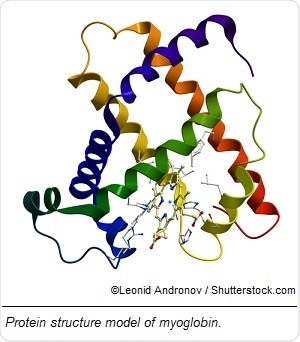 Proteomics is a branch of molecular biology that focuses on the protein expression within an organism or cell. It is a comprehensive study with high throughput of a specific proteome to identify particular cellular processes.
Proteomics is a branch of molecular biology that focuses on the protein expression within an organism or cell. It is a comprehensive study with high throughput of a specific proteome to identify particular cellular processes.
Information about the protein that may be useful in the study of proteomics includes the affluence, variations, alterations and partners or networks of the protein being studied. These findings can help to improve our understanding of the structure, function and interactions of all of the proteins that exist within a specific organism.
There are several promising new avenues that may improve the current methods of proteomics substantially.
(Video 4 of 8) Proteomics: Proteins At Work
Protein function in vivo
The understanding of protein function in cells, both healthy and diseased, can be improved by:
- Quantifying absolute proteins
- Monitoring post-translational protein modifications
In many real situations in the body, the concentration of protein does not differ but the function of proteins change due to post-translational modifications (PTM). An emerging trend in proteomics is the development of methods to monitor PTM, which has the potential to lead to a deepened understanding of the protein function.
It is important for proteomics research to focus on the behavior of proteins in a real life environment and for each study to be considered in the context of its environment. At present, in the field of proteomics, the environmental context is not well addressed, despite its importance. This is expected to have greater priority as the study of proteomics progresses. For example, the increasing use of chemical cross-linkers in proteomics may help to improve this issue.
Technological developments: real-time imaging
There has been significant improvement in technology in recent decades, which has made the study of proteomics possible. However, further improvements can be made to increase the ease of study and utility of the information gained from research.
For example, the introduction of sophisticated methods to visualize and create images of proteins within the cells in real time could also lead to significant progression in the field of proteomics. The ability to observe and capture the behavior of actual proteins and other molecules in living cells is well appreciated, and something to expect in the future as technologies are developed.
Real-time imaging of single RNA translation into protein in a living cell
"Using their custom microscope, the Stasevich lab at Colorado State University has imaged the translation of single RNA into protein in a living cell. The red dots are RNA, and the proteins fluoresce blue or green. In the background the cell nucleus can be seen in green, where the mature proteins gather after they're created in the cell cytoplasm."
Cellular systems and biology breakthroughs
It is evident that further advancement in the field of quantitative proteomics could lead to increased analysis and understanding of cellular systems and biology. This has the potential to be applied in a healthcare setting to improve patient health outcomes.
There are various factors that can impact the health of a biological system, such as the cell cycle, differentiation of cells, carcinogenesis and biophysical factors. Changes in these areas can lead to altered transcription and translation of proteins, hence leading to differences in the proteome.
Therefore, proteomics can help to understand changes in the cellular system and applied in a health setting. This would likely be used in practice alongside other disciplines such as genomics and metabolomics.
Proteome of human plasma
Another significant goal for current proteomics researchers is to characterize the proteome of human plasma. However, this is thought to the most challenging proteome within the human body as it includes various proteins, such as immunoglobulin, cytokines, hormones and hemostatic proteins.
The proteome of human plasma holds insight about the physiological wellbeing of all other tissues within the body and is easily accessible for testing from individuals. Therefore, if the proteome can be established the information would be invaluable for medical purposes and could potentially be used as a diagnostic tool for a wide range of health conditions.
References
- http://bioinformatics.conferenceseries.com/events-list/emerging-trends-in-proteomics
- https://www.ncbi.nlm.nih.gov/pubmed/15113093
- https://www.ncbi.nlm.nih.gov/pubmed/22169889
- https://www.ncbi.nlm.nih.gov/pubmed/24037243
- https://www.ncbi.nlm.nih.gov/pubmed/19884488
- https://www.ncbi.nlm.nih.gov/pubmed/27135364
Further Reading
Last Updated: Aug 23, 2018